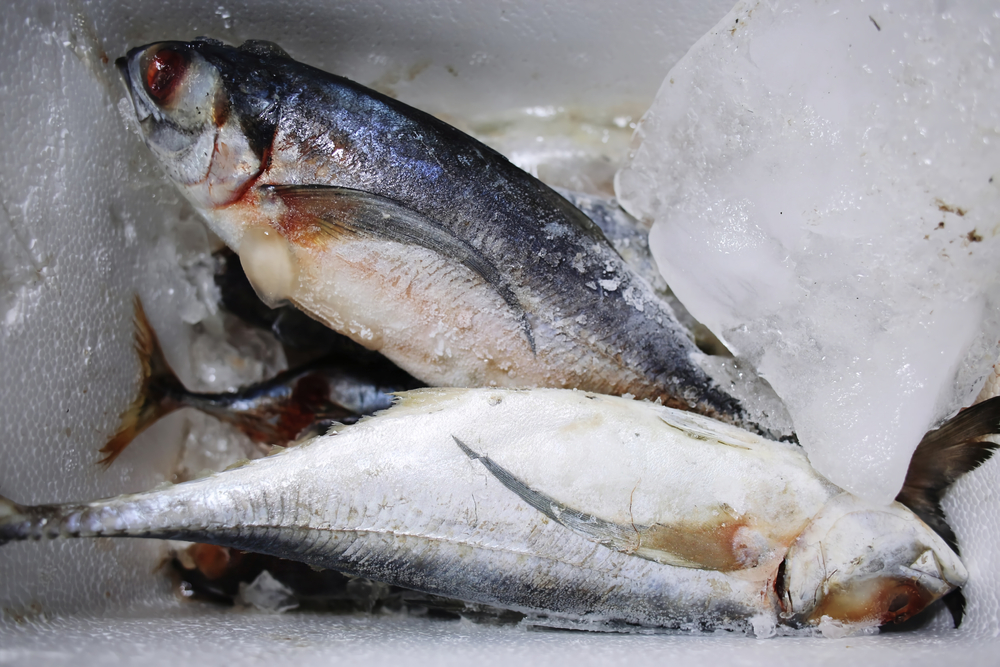Fish can last for three to six months in the freezer, depending on its fat content. The less fat a fish has, the longer it stays good in a freezer.
When concerned about fish lifespan in the freezer, it’s important to consider the packaging methods you use because they impact the length of time your fish will stay good.
Read on to learn about best practices for freezing fish and how to use them in recipes once you thaw them.

Can You Freeze Fish?
Fresh fish freezes well, provided you freeze it within 48 hours of your purchase. If you catch your own fish, it’s crucial to keep it in as cool of a climate as possible until you can gut and clean it. Placing it in a bucket of ice is ideal.
When preparing to freeze fish, you should never let the fish sit in water. Otherwise, it’ll lose some of its flavors. Similarly, you shouldn’t freeze fish in a bowl of water, which is a common practice.
Related Article: Can you freeze cooked shrimp?
How to Freeze Fish: Step-by-Step Guide
Knowing that you can freeze fish is a start, but how you freeze fish makes the difference between a good or bad experience when you eat it.
There are several methods you can use to freeze fish, including:
- Vacuum seal
- Plastic wrap
- Wrapping in freezer paper
- Glazing the fish
As mentioned earlier, many people use the method of freezing fish in water. We don’t recommend this since it deteriorates the flavor and texture.
However, you can glaze a fish. The glazing method for preparing fish for freezing involves dunking them in cold water and setting them on a pan in your freezer. Once the first layer of water freezes around the fish, you dip them in cold water again and freeze that layer.
You can repeat this process until there’s an approximately ¼-inch glaze around your fish. From there, you should place these fish in a freezer bag and squeeze as much air as possible out of the bag before placing it into your freezer for long-term storage.
Regardless of the method you choose, your goal when freezing fish should be to keep as much air out of the packaging as possible. Not only will an airtight seal preserve the flavor of your fish, but it’ll also prevent freezer burn.
Contrary to popular belief, freezer burn isn’t harmful to the human body. However, it occurs from moisture loss when air has access to frozen fish, resulting in a dryer, less tasty meal.
For this reason, we recommend using a vacuum seal. If you don’t want to invest in this machine, then wrapping your fish in plastic wrap or freezer paper can work too.
In either case, it’s essential to place the fish in a freezer bag after you cover them in a couple of layers of plastic wrap or freezer paper. As you can probably guess by now, the reason for this is to prevent air from reaching your fish.
How Long Does Frozen Fish Last?

You can expect most fish to stay good in your freezer for six months. Make sure to label the bags with the date you put them in your freezer to make it easier to keep track of how long they’ve been in there.
That said, fatty fish don’t handle being in the freezer as well. Therefore, you should eat fatty fish within three months of freezing them.
Examples of fatty fish include:
- Salmon
- Trout
- Bluefish
- Mackerel
We won’t get too scientific on you here, but there’s a biological reason why you don’t want to let your fatty fish sit in your freezer for long—they can oxidize, causing smelly odors and unwanted flavors. The more unsaturated fat a fish has, the higher the chance that it’ll undergo oxidation sooner.
Assuming you applied the airtight freezing methods we covered above and that you take your fish out of the freezer at the appropriate time, you might be wondering how to defrost them.
Although it’s possible to defrost your frozen fish in the fridge, we don’t recommend it. That’s because it allows bacteria to grow.
Instead, it’s best to defrost your fish by running cold tap water over it. Make sure to leave the package on. Otherwise, some of the flavors will wash out of your fish.
As a final word of warning, never thaw frozen fish on the counter. That opens the opportunity for even more bacteria to grow than defrosting it in your fridge.
How to Tell if Frozen Fish is Bad
So, below are some signs to look for that you have a case of rotten frozen fish on your hand:
- A strong “fishy” or ammonia smell
- Slimy film
- Lightweight
- Flakes or patches that are white or grey
The first two signs indicate your fish likely encountered bacteria and is rotting. Although bacteria can’t live in temperatures much below 40 degrees Fahrenheit, if your freezer breaks or there’s a power outage, it could cause the temperature to rise to a bacteria-friendly zone.
The last two signs are an indication of freezer burn. From a health standpoint, there’s nothing wrong with eating freezer-burned fish. From a tastebud standpoint, the fish will have a dry texture and an off-flavor.
It should go without saying, but if you freeze fish that’s on the brink of going bad, it’ll come out the same way. For this reason, we recommend freezing fresh fish within 48 hours.
Frozen Fish Recipe Ideas
If you freeze a firm, non-fatty fish, you can prepare the fillets on the grill, in the oven, or on the stove as you would with fresh fish. However, if you freeze a fattier fish or use the glazing method we described above, which can cause the fish to take on a softer texture, using pieces of the fish as part of a larger recipe is often the best choice.
For example, bluefish takes on a different texture when it comes out of the freezer due to its fattiness. So, it’s an excellent fish to use in fish cakes and pasta.
Fish stews and curries are other wonderful dishes to make with frozen fish. There are countless recipes you can choose from that range from spicy to sweet flavors. However, you’ll typically want to add your defrosted fish as one of the last steps. As with fresh fish, defrosted fish cooks quickly.
Hearty fish pies are another great recipe to make with frozen fish. As with stews and curries, the fish is one of the last ingredients to add to a fish pie. You’ll also want to make sure to use fully thawed fish, as you’ll need to break the fish into chunks by hand.
Frequently Asked Questions
Do you still have questions about freezing fish? Below are answers to some of the most common questions we receive.
Yes, you can store cooked fish in a freezer, but only for about one month.
Ideally, you should never store thawed fish in a fridge. It’s best to thaw frozen fish by running it under cold water with the package still wrapped around it.
However, if you must store thawed fish in a refrigerator, do so for no longer than 24 hours and cook the fish thoroughly to kill bacteria.
To extend the life and taste of your fish before freezing it, wash it well and dry it with a paper towel. Always keep the fish in a cool place before freezing.
Also, use a vacuum seal or wrap the fish in multiple layers of plastic wrap or freezer paper before placing it in a freezer bag.
Freezer burn removes moisture from fish. As a result, the texture becomes dry, and the fish may feel chewy. Furthermore, freezer burn takes away some of the fish’s flavor. It also might cause the fish to take on flavors of other foods around it, especially if you don’t correctly package the fish.
If your frozen fish doesn’t have a slimy texture over its surface and doesn’t have a stronger than usual fishy smell, it’s still good to eat.
Conclusion
The next time someone asks you, “How long does fish last in the freezer?” you’ll know to tell them three to six months. By ensuring you use airtight methods to store your fish and that you keep track of the date you put them in your freezer, you’ll get to enjoy dining on tasty, frozen fish year-round.







